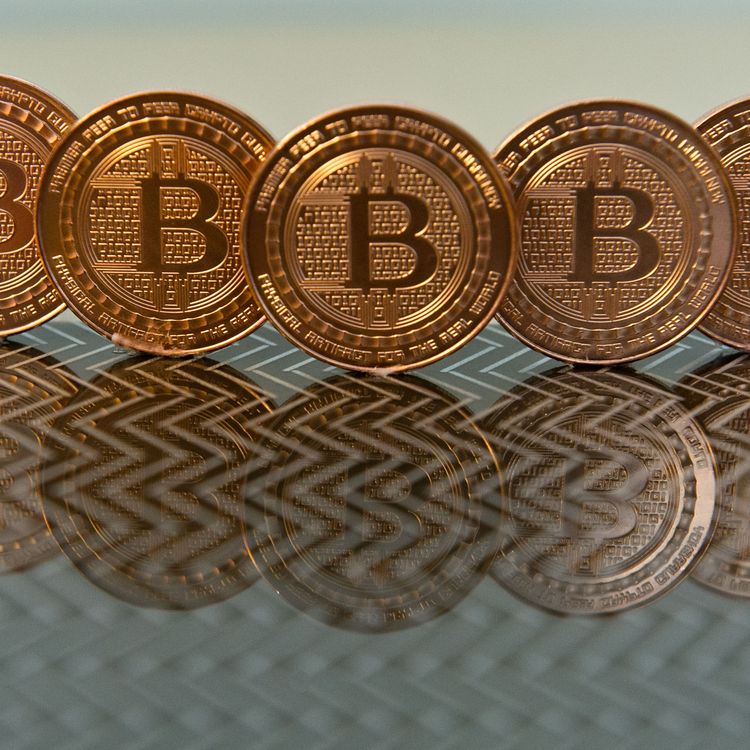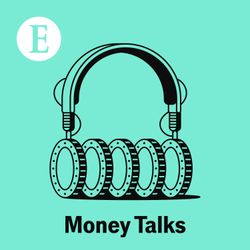Share

Money Talks from The Economist
Money talks: I am Bitcoin
•
Craig Wright claims to have founded the cryptocurrency. Our technology and business affairs editors debate whether his 'proofs' add up. Plus China's looming debt crisis - and the economics of Game of Thrones
More episodes
View all episodes

Car crash: has Elon Musk damaged his business empire?
47:14|When Elon Musk took on a new job leading Donald Trump’s Department of Government Efficiency, it might have seemed like a savvy move. But while he was busy slashing US federal spending, his business empire was facing serious threats. This week, Tesla revealed its first quarter results. Net income was down 70%, while car revenues were down 20%. On a call with Tesla investors, Mr Musk vowed to take a step back from Doge. But is it too little, too late? And has cosying up to Mr Trump paid off in any way at all?Hosts: Ethan Wu and Tom Standage. Guests: Ross Gerber of Gerber Kawasaki Wealth and Investment Management; Tu Le, founder of Sino Auto Insights; and Chris Quilty, co-founder of Quilty Space.Transcripts of our podcasts are available via economist.com/podcasts.Listen to what matters most, from global politics and business to science and technology—subscribe to Economist Podcasts+.For more information about how to access Economist Podcasts+, please visit our FAQs page or watch our video explaining how to link your account.
Dwarkesh Patel: the man who has the ear of Silicon Valley
43:53|AI may be young and fast-moving, but so is Dwarkesh Patel. The 24-year-old rose from nowhere to become Silicon Valley’s favourite podcaster—attracting guests such as Mark Zuckerberg and Satya Nadella. But Dwarkesh’s greatest ambition has been to interrogate the leading acolytes of artificial intelligence. He’s written a new book about the rise of LLMs and the future of AI, based on numerous interviews with AI researchers, CEOs, economists and philosophers. This week “Money Talks” turns the tables on him, as we ask him the questions.Hosts: Mike Bird and Ethan Wu. Guest: Dwarkesh Patel, host of “Dwarkesh Podcast” and author of "The Scaling Era: An Oral History of AI, 2019-2025”.Transcripts of our podcasts are available via economist.com/podcasts.Listen to what matters most, from global politics and business to science and technology—subscribe to Economist Podcasts+.For more information about how to access Economist Podcasts+, please visit our FAQs page or watch our video explaining how to link your account.
Market mayhem: how Trump's tariffs debacle could hurt brand America
44:02|This week America’s financial system came dangerously close to a full-blown crisis. Donald Trump’s “Liberation Day” tariffs announcement sent markets down by double digit percentages late last week, wiping out trillions of dollars in value. Then, just as suddenly, Mr Trump’s decision to pause some of the tariffs sent markets skyrocketing, almost back to where they started. So, crisis over? Or has the Trump administration done lasting damage to the attractiveness of US financial markets?Hosts: Mike Bird and Ethan Wu. Guests: Joshua Roberts, The Economist’s capital markets correspondent; and Sonal Desai, chief investment officer at Franklin Templeton Fixed Income.Transcripts of our podcasts are available via economist.com/podcasts.Listen to what matters most, from global politics and business to science and technology—subscribe to Economist Podcasts+.For more information about how to access Economist Podcasts+, please visit our FAQs page or watch our video explaining how to link your account.
Import-extort: what to make of Donald Trump’s titanic tariffs
46:35|After months of bluster, he’s finally done it. At a ceremony in the White House Rose Garden, Donald Trump overturned decades of American trade policy with a simple signature. The new wave of trade restrictions, if implemented in full, will raise tariffs to the highest level in more than a century. So how bad could it get?Hosts: Mike Bird and Ethan Wu. Guests: The Economist’s Simon Rabinovitch; and Douglas Irwin, a professor of economics at Dartmouth College.Transcripts of our podcasts are available via economist.com/podcasts.Listen to what matters most, from global politics and business to science and technology—subscribe to Economist Podcasts+.For more information about how to access Economist Podcasts+, please visit our FAQs page or watch our video explaining how to link your account.
Love thy neighbour: South-East Asia’s China problem
41:56|South-East Asian countries are experiencing a new influx of cheap Chinese goods, pushing down prices and pressuring the region's domestic companies. And it's not just low-end goods like textiles or furniture, China has also become a powerhouse in advanced manufacturing. Some of these products, like EVs and legacy chips, are the same industries that South-East Asian countries have set their own sights on as engines of growth. So how can South-East Asia hold its own, in the face of the Chinese manufacturing juggernaut?Hosts: Mike Bird and Ethan Wu. Guests: Burin Adulwattana from Kasikorn Bank, a Thai commercial lender; and the Asia Society’s Brendan KellyTranscripts of our podcasts are available via economist.com/podcasts.Listen to what matters most, from global politics and business to science and technology—subscribe to Economist Podcasts+.For more information about how to access Economist Podcasts+, please visit our FAQs page or watch our video explaining how to link your account.
Reid Hoffman: a Silicon Valley superstar on Musk, AI and the future of humanity
39:02|The members of the so-called Paypal Mafia, who founded and grew the payments startup at the turn of the 21st century, have gone on to become the leading lights of Silicon Valley. Their ranks include Elon Musk, Peter Thiel and many others who have gone on to found and build many of the best-known firms in tech—or even run departments in Donald Trump’s government. Among them is Reid Hoffman, who co-founded LinkedIn, which Microsoft bought for $26bn in 2016. Now he invests in AI firms and he has also written a new book about what the technology could mean for the future of humanity. He also has some choice words for Elon Musk.Hosts: Mike Bird and Ethan Wu. Guest: Reid Hoffman.Transcripts of our podcasts are available via economist.com/podcasts.Listen to what matters most, from global politics and business to science and technology—subscribe to Economist Podcasts+.For more information about how to access Economist Podcasts+, please visit our FAQs page or watch our video explaining how to link your account.
Developing crisis: why foreign aid needs an overhaul
46:34|At the end of January, Donald Trump’s administration announced that all work carried out by the United States Agency for International Development (USAID) would stop immediately. This week, secretary of state Marco Rubio announced that 83% of USAID programmes had been cancelled. Across Europe, governments are cutting foreign aid budgets, too. What caused the aid recession? And what should aid money really be used for?Hosts: Ethan Wu and Mike Bird. Guests: The Economist’s Cerian Richmond Jones; and Professor Stefan Dercon of the University of Oxford. Transcripts of our podcasts are available via economist.com/podcasts.Listen to what matters most, from global politics and business to science and technology—subscribe to Economist Podcasts+.For more information about how to access Economist Podcasts+, please visit our FAQs page or watch our video explaining how to link your account.
Tariff turmoil: Donald Trump’s trade policy chaos
51:50|After months of posturing, Donald Trump seemingly made good on his promise. On March 4th, he slapped a 25% tariff on goods crossing into America from Mexico and Canada, and raised tariffs on all goods arriving from China to 20%, from 10%. Investors took the news badly, wiping more than $3trn from the value of S&P 500 stocks. But just over 48 hours after they came into force, Mr Trump paused the tariffs on Mexico and Canada. So what should investors make of the president’s erratic new trade policy?Hosts: Mike Bird and Ethan Wu. Guests: The Economist’s Simon Rabinovitch, Sarah Birke and Don Weinland.Transcripts of our podcasts are available via economist.com/podcasts.Listen to what matters most, from global politics and business to science and technology—subscribe to Economist Podcasts+.For more information about how to access Economist Podcasts+, please visit our FAQs page or watch our video explaining how to link your account.
Triple threat: the European economy has a Trump problem
45:29|Europe’s economy is in trouble. Growth has been moribund for a decade and a half. Worries about the continent's shaky fiscal foundations and its heavy regulatory burden are only growing. Now, governments across the continent have a third economic threat to worry about: Donald Trump. The US president has threatened tariffs on European exports and told Nato allies they should spend 5% of GDP on defence—an unaffordable expense for most of the region. So how much trouble is Europe in?Hosts: Mike Bird and Ethan Wu. Guests: The Economist’s Christian Odendahl and Stanley Pignal; and Luis Garicano, an economist and former member of the European Parliament.Transcripts of our podcasts are available via economist.com/podcasts.Listen to what matters most, from global politics and business to science and technology—subscribe to Economist Podcasts+.For more information about how to access Economist Podcasts+, please visit our FAQs page or watch our video explaining how to link your account.